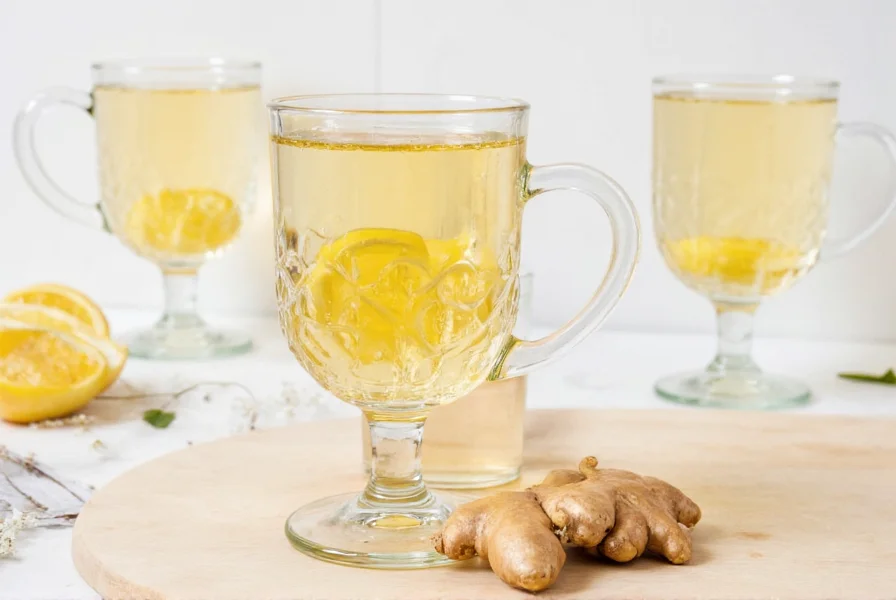When experiencing nausea, many people reach for ginger ale as a traditional remedy. While it can offer some relief for mild cases, understanding its limitations and how it compares to other ginger forms is crucial for effective nausea management. The active compounds in ginger, particularly gingerols and shogaols, have demonstrated anti-nausea properties in multiple scientific studies. However, most mainstream ginger ale brands contain minimal actual ginger extract—often less than 0.5%—relying instead on artificial flavors and high sugar content that may actually worsen nausea for some individuals.
The Science Behind Ginger and Nausea Relief
Ginger's effectiveness against nausea stems from its bioactive compounds that interact with the gastrointestinal tract and central nervous system. Research published in the American Journal of Obstetrics and Gynecology shows ginger significantly reduces nausea severity compared to placebo, with effects noticeable within 20-30 minutes of consumption.
These compounds work through multiple mechanisms:
- Modulating serotonin receptors involved in nausea pathways
- Reducing inflammation in the digestive tract
- Accelerating gastric emptying, which helps settle the stomach
- Interacting with the brain's vomiting center

Ginger Ale vs. Pure Ginger Products
Not all ginger products deliver equal nausea relief. The table below compares common ginger options for nausea management:
| Ginger Product | Actual Ginger Content | Effectiveness for Nausea | Key Considerations |
|---|---|---|---|
| Fresh ginger tea | High (1-2g per cup) | ★★★★☆ | Most effective option; requires preparation |
| Ginger supplements | Standardized (250-500mg) | ★★★★☆ | Dosage controlled; consult doctor first |
| Premium ginger beer | Moderate (1-3%) | ★★★☆☆ | Higher ginger content than most ginger ales |
| Commercial ginger ale | Low (<0.5%) | ★☆☆☆☆ | High sugar content may worsen nausea |
When Ginger Ale Might Help Nausea
Ginger ale's potential benefits come primarily from two aspects: the small amount of actual ginger it contains and the psychological comfort of a familiar remedy. It may provide mild relief in these specific situations:
- Motion sickness: The carbonation might help settle the stomach during travel
- Mild morning sickness: For pregnant women who find the flavor tolerable
- Post-operative nausea: As part of a broader nausea management protocol
- Rehydration: When nausea accompanies dehydration from illness
However, for severe nausea or vomiting, ginger ale alone is unlikely to provide sufficient relief. The high sugar content in most commercial brands can actually delay gastric emptying, potentially worsening nausea for some people.
Choosing Effective Ginger Products for Nausea
If you're considering ginger for nausea relief, these evidence-based recommendations can help you select the most effective options:
- Read ingredient labels carefully: Look for "real ginger" or "ginger root extract" as an early ingredient. Avoid products listing "natural flavors" as the primary ginger source.
- Consider ginger concentration: Products with at least 1% actual ginger content show better results in clinical studies.
- Watch sugar content: Opt for low-sugar or sugar-free options, as high sugar can counteract ginger's benefits.
- Try fresh ginger preparations: Homemade ginger tea (1-2g fresh ginger steeped in hot water for 10 minutes) provides higher ginger concentration.
- Consider timing: Consume ginger products before nausea becomes severe for best results.

Evidence-Based Alternatives to Ginger Ale for Nausea
When ginger ale proves ineffective, these evidence-supported alternatives may provide better nausea relief:
- Ginger chews or candies: Provide concentrated ginger without excessive liquid
- Acupressure wristbands: Shown effective for motion sickness and morning sickness
- Peppermint tea: Soothes the digestive tract through different mechanisms
- Oral rehydration solutions: Address both nausea and dehydration simultaneously
- Medical options: For persistent nausea, consult a healthcare provider about prescription options
Remember that severe or persistent nausea—especially when accompanied by vomiting lasting more than 24 hours, inability to keep fluids down, or other concerning symptoms—requires medical evaluation to address potential underlying causes.
Frequently Asked Questions
Does ginger ale help with morning sickness during pregnancy?
Ginger ale may provide mild relief for some pregnant women experiencing morning sickness, but its effectiveness is limited. Most commercial ginger ales contain minimal actual ginger. For better results, try ginger tea made with 1-2 grams of fresh ginger steeped in hot water, which has shown significant reduction in pregnancy-related nausea in clinical studies. Always consult your healthcare provider before using ginger products during pregnancy.
How much ginger is actually in ginger ale?
Most mainstream ginger ale brands contain less than 0.5% actual ginger extract, with some containing as little as 0.1%. The distinctive flavor primarily comes from artificial ginger flavoring and sugar. Premium craft ginger beers typically contain 1-3% real ginger, making them potentially more effective for nausea relief. Check the ingredient list for "ginger root extract" or "real ginger" to identify products with meaningful ginger content.
Can ginger ale make nausea worse?
Yes, for some people, commercial ginger ale can potentially worsen nausea due to its high sugar content (typically 20-30g per 12oz serving). Excessive sugar can delay gastric emptying, which may increase feelings of nausea. The carbonation might also cause bloating in sensitive individuals. If you find ginger ale worsens your nausea, try flat ginger ale (let it sit until bubbles dissipate) or switch to lower-sugar ginger options like fresh ginger tea or ginger chews.
How quickly does ginger ale work for nausea?
When ginger ale contains sufficient actual ginger, effects may begin within 20-30 minutes, but most commercial brands have such low ginger content that noticeable relief is unlikely. Pure ginger products typically show effects within this timeframe. For best results, consume ginger before nausea becomes severe. If using ginger for motion sickness, take it 30-60 minutes before travel. The effectiveness varies significantly based on the actual ginger concentration in the product.
What's the difference between ginger ale and ginger beer for nausea?
Traditional ginger beer typically contains significantly more actual ginger (1-3%) compared to most ginger ales (<0.5%), making it potentially more effective for nausea relief. Ginger beer is often fermented, which may enhance ginger's bioactive compounds. However, many modern "ginger beers" are simply strongly flavored sodas with minimal real ginger. Look for products labeled "fermented" or with ginger listed among the first ingredients for the best nausea-relieving potential.










 浙公网安备
33010002000092号
浙公网安备
33010002000092号 浙B2-20120091-4
浙B2-20120091-4